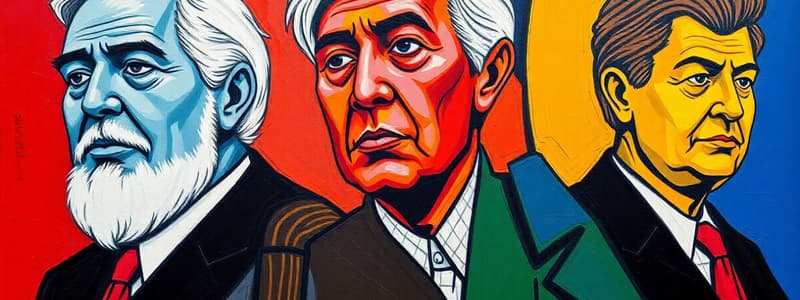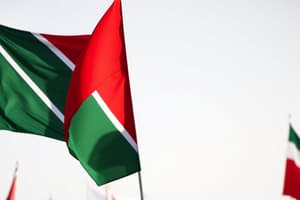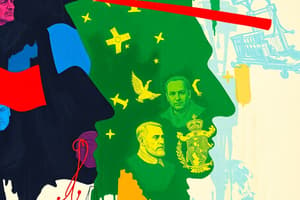Podcast
Questions and Answers
What major theme is associated with President Trump's campaign?
What major theme is associated with President Trump's campaign?
- Promoting multiculturalism
- Putting America first (correct)
- Reducing America’s global influence
- Advocating for international cooperation
Which leader is associated with Hindu nationalism in India?
Which leader is associated with Hindu nationalism in India?
- Narendra Modi (correct)
- Jair Bolsonaro
- Xi Jinping
- Viktor Orbán
Which president of China has been compared to Mao Zedong in terms of power?
Which president of China has been compared to Mao Zedong in terms of power?
- Xi Jinping (correct)
- Narendra Modi
- Viktor Orbán
- Jair Bolsonaro
What was the global perception of governance after the collapse of the Soviet Union?
What was the global perception of governance after the collapse of the Soviet Union?
What type of nationalism has Viktor Orbán emphasized in Hungary?
What type of nationalism has Viktor Orbán emphasized in Hungary?
What do political scientists generally agree upon regarding the concept of a nation?
What do political scientists generally agree upon regarding the concept of a nation?
What was largely accepted by global leaders concerning the ideological consensus?
What was largely accepted by global leaders concerning the ideological consensus?
According to political theory, what does nationalism primarily seek to achieve?
According to political theory, what does nationalism primarily seek to achieve?
How is nationalism described in terms of collective sentiment?
How is nationalism described in terms of collective sentiment?
Which regions were significantly affected by nationalism in the mid-1990s?
Which regions were significantly affected by nationalism in the mid-1990s?
During the COVID-19 pandemic, which phenomenon was highlighted in national responses?
During the COVID-19 pandemic, which phenomenon was highlighted in national responses?
Which prominent figure equated nationalism with racism?
Which prominent figure equated nationalism with racism?
What actions were taken by countries within the European Union during the pandemic?
What actions were taken by countries within the European Union during the pandemic?
What was Martin Luther King, Jr.'s view on nationalism?
What was Martin Luther King, Jr.'s view on nationalism?
What symbolic representation was used by leaders while addressing their countries during the pandemic?
What symbolic representation was used by leaders while addressing their countries during the pandemic?
What role has nationalism historically played in movements for freedom and justice since the 18th century?
What role has nationalism historically played in movements for freedom and justice since the 18th century?
How do contemporary government leaders often invoke nationalism?
How do contemporary government leaders often invoke nationalism?
Which of the following leaders advocated for nationalism without harming others?
Which of the following leaders advocated for nationalism without harming others?
What type of nationalism is exemplified by Justin Trudeau's vision for Canada?
What type of nationalism is exemplified by Justin Trudeau's vision for Canada?
Which of the following statements best encapsulates the dual nature of nationalism mentioned?
Which of the following statements best encapsulates the dual nature of nationalism mentioned?
Study Notes
Nations and Nationalism
- Nationalism is significantly relevant in contemporary politics, more so than in the past half-century
- The global resurgence of nationalism is particularly evident in the US
- President Trump's election campaign, centered around "America First" and "Make America Great Again," exemplifies this trend
- Similar nationalist movements have gained power globally
Introduction
- Nationalism is highly relevant in current global politics
- The resurgence of nationalism is most visible in the US
- President Trump's campaign emphasized putting America first and making it great again
- Similar movements are happening globally
Is Trump a Nationalist?
- A visual representation of the current global nationalism is shown using images of Trump and signs promoting "Make America First Again"
The Global Re-awakening of Nationalism
- Brazil's Jair Bolsonaro, borrowing from Trumpian nationalism, secured the presidency in 2018
- Hungary's Viktor Orbán, in power since 2010, emphasizes national identity
- India's Narendra Modi's election victories (2014 and 2019) championed Hindu nationalism
- Xi Jinping, president of China since 2013, promotes Han-based nationalism
Did History End in 1989?
- The collapse of the Soviet Union brought about a perceived end to historical conflict
- Democracy, capitalism and globalization were thought to be the definitive answers
- However, nationalism remained a potent force, especially in the mid-1990s
- Nationalism played a crucial role in Balkan, Central and Eastern European, and Latin American politics
The COVID-19 Pandemic
- The pandemic, despite starting globally, highlighted the national nature of decision-making and political response
- EU countries, including France and Germany, closed their borders
- National flags were prominent in leaders' addresses during the pandemic, emphasizing national identity
What Political Theory Says I
- Political scientists frequently agree that nations are imagined communities with culturally significant roots and traditions
- Individuals qualify for membership in a nation through practices, beliefs or inherited attributes
What Political Theory Says II
- Nationalism is a celebration of the nation and a desire for national sovereignty over territory
- Principle emphasizes congruence between political and national entities
What Political Theory Says III
- Nationalism is a collective sentiment uniting people who share a sense of large-scale political solidarity
- This sentiment is used to create, legitimize, or challenge existing states
Who Should We Feel Empathy For?
- This section addresses the question of whom to empathize with when considering nationalism
Not Everyone Likes It
- Prominent voices criticize rising nationalism
- French President Macron argues that nationalism undermines moral values.
- George Monbiot, a Guardian columnist, equates nationalism with racism
- Arundhati Roy criticizes the use of flags as tools for control, emphasizing the ways nations use rituals to control beliefs
In the 20th Century
- 20th-century critiques of nationalism included:
- The concept of nationalism as "the measles of mankind" (Einstein)
- Nationalism as the "greatest evil" (Tagore)
- Chauvinism (Hannah Arendt)
- Nationalism as a false god (King Jr.)
Is Nationalism Always Bad?
- Nationalism isn't inherently negative
- It encompasses various interpretations and motivations
There Are Many Nuances in This Debate I
- Nationalism encompasses various national attachments and isn't always divisive; examples like Spain and Catalonia are given
- Nationalist sentiments can be used to gain political power
- Nationalism has not consistently been used to harm democracies, wage wars or marginalize minorities
- Examples include national and collective service, fighting in wars and wearing masks in pandemic
- These prosocial behaviors highlight the multifaceted aspects of nationalism
There Are Many Nuances in This Debate II
- Nationalism has been a driving force in movements for freedom and justice, such as the American and French Revolutions
- It has also been employed to oppose colonial regimes
- Figures like Mahatma Gandhi and Nelson Mandela illustrate the diverse aspects of nationalism
Non-Ethnic Nationalism?
- Contemporary leaders frequently employ historical narratives to portray national belonging.
- Some use a value-based approach (e.g., Indonesia)
- Other examples focus on shared values (e.g., Canada)
US vs. Them
- Nationalisms often draw distinctions between citizens' and noncitizens' rights.
- Some recent nationalisms utilize internal hierarchies based on race, religion, or ethnicity to segregate groups.
- Examples are provided: Trump's white nationalism, Modi's Hindu nationalism, and Xi's Han nationalism
Nationalism vs. Bad Nationalism
- Exclusionary nationalisms pose problems for democracy, preventing genocide, and ensuring public benefits
- These types of nationalisms pit people against each other, potentially harming various groups.
Research Questions
- How and when are dominant national narratives formed?
- Does invoking national solidarity invariably lead to denigration of other nations and persecution?
- Under what conditions does the rise of nationalism undermine democracy, development, human rights, and peace?
A Gap in the Literature
- Historical research on nationalism is scarce
- Key philosophers like Machiavelli, Tocqueville and Mill have pondered the relationship between nationalism and democracy
- Some political scientists have suggested a close connection between national unity and democracy
Comparative Political Science
- Single-case studies commonly appear in discussions of political science
- Comparative political science often avoids historical nuance for easier generalizations
- The approach often prioritizes European and American perspectives
- The field is evolving, and the neglect of nationalism is yielding to contemporary study
Next Classes
- Students are asked to critically assess classic debates in nationalism scholarship and identify the origins of the current consensus. This involves identifying and examining three key trends: first, comparative historical scholarship that analyzes nationalism's relationship with states, stories, and conflicts. Secondly, behavioral scholarship that explores individual attachment to a nation via surveys and experimentation. The third trend involves ethnographic observation, examining daily practices that sustain national identity.
- The exploration will encompass insights from diverse domains to identify gaps in empirical knowledge
Studying That Suits You
Use AI to generate personalized quizzes and flashcards to suit your learning preferences.




